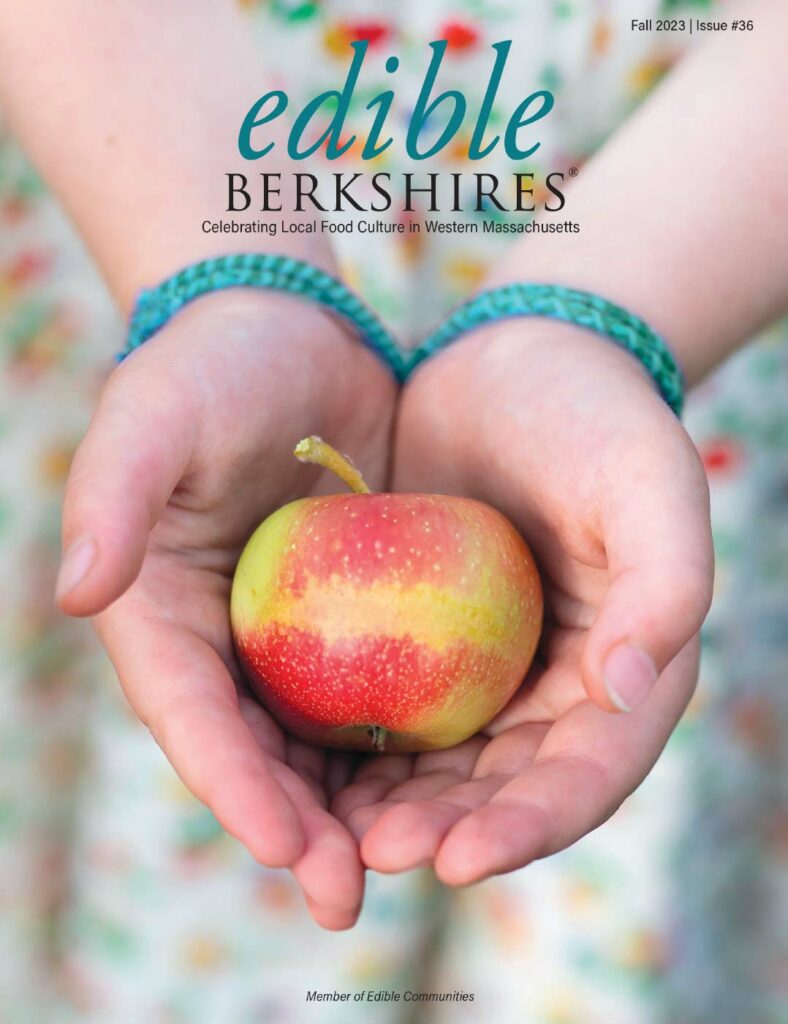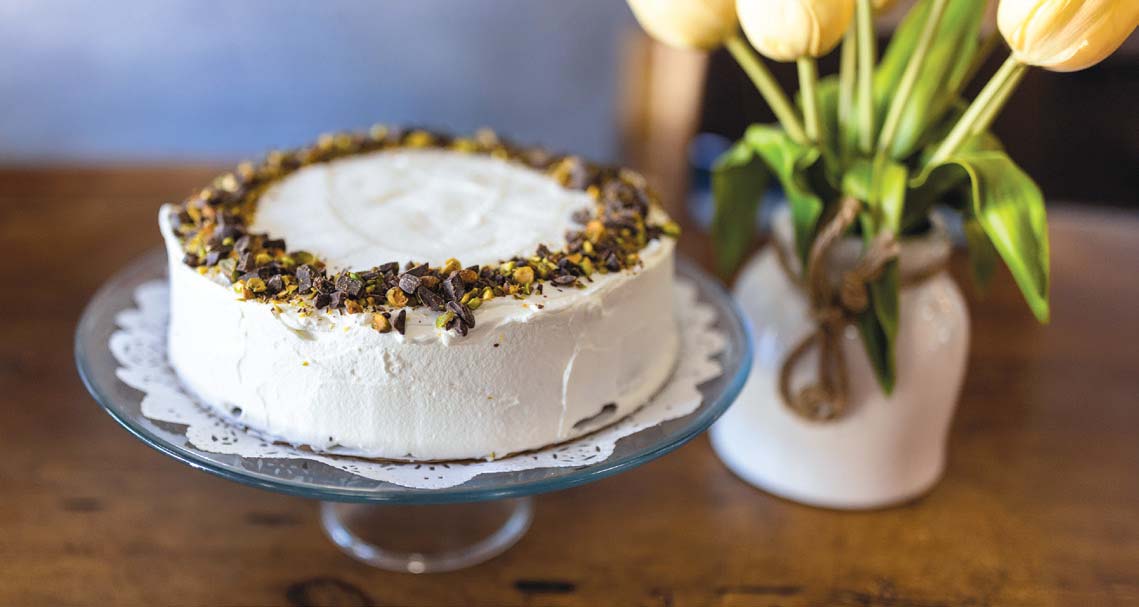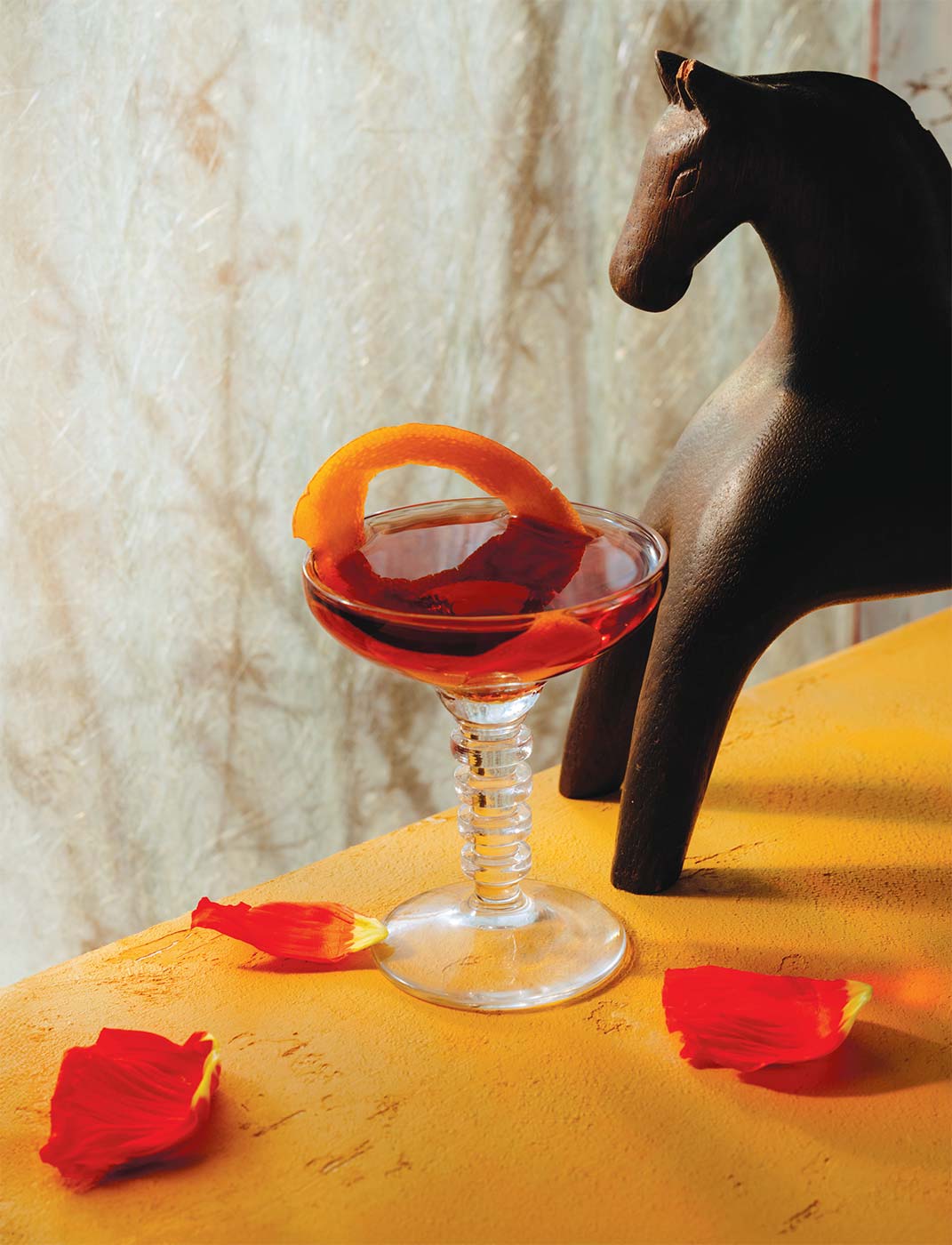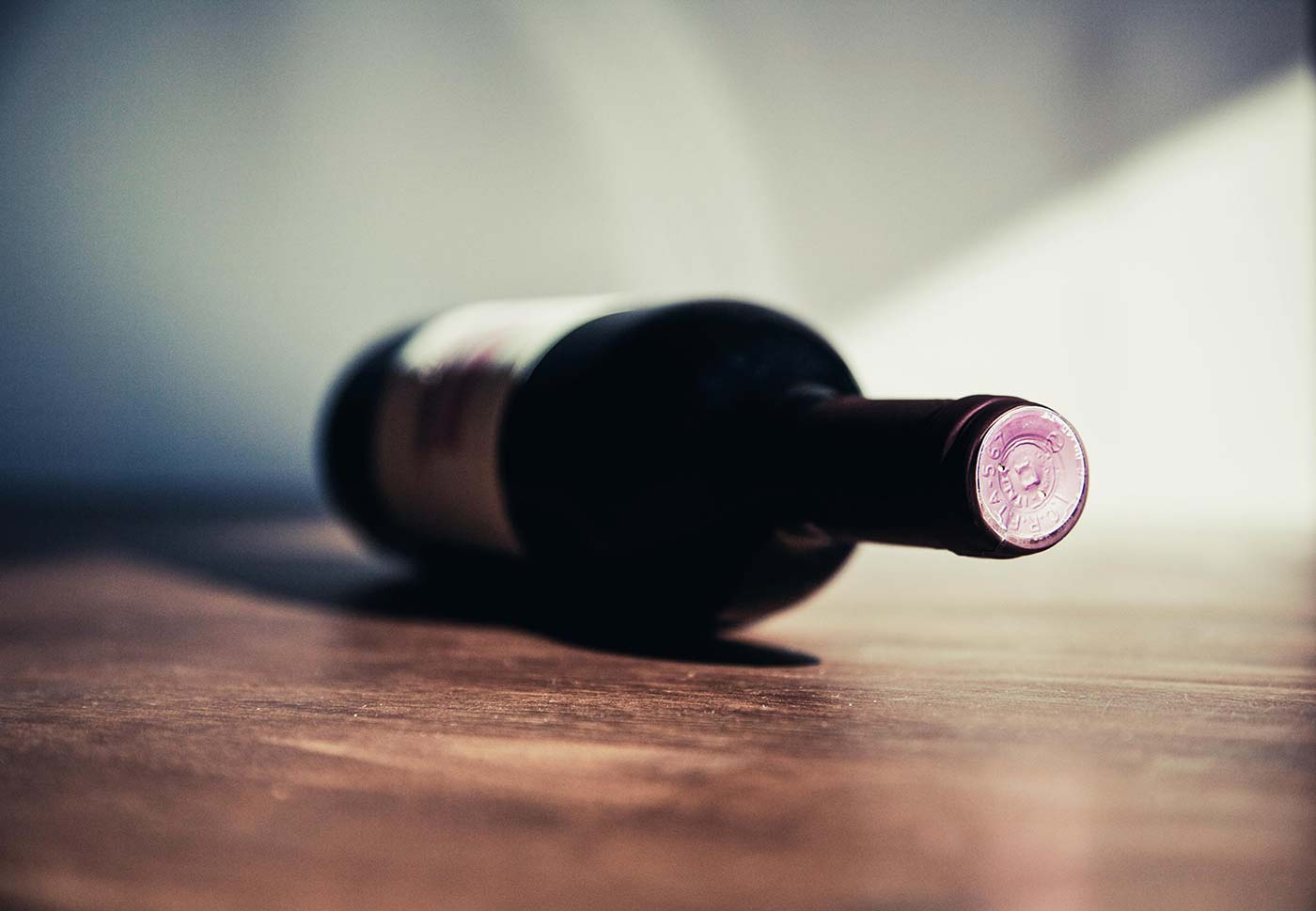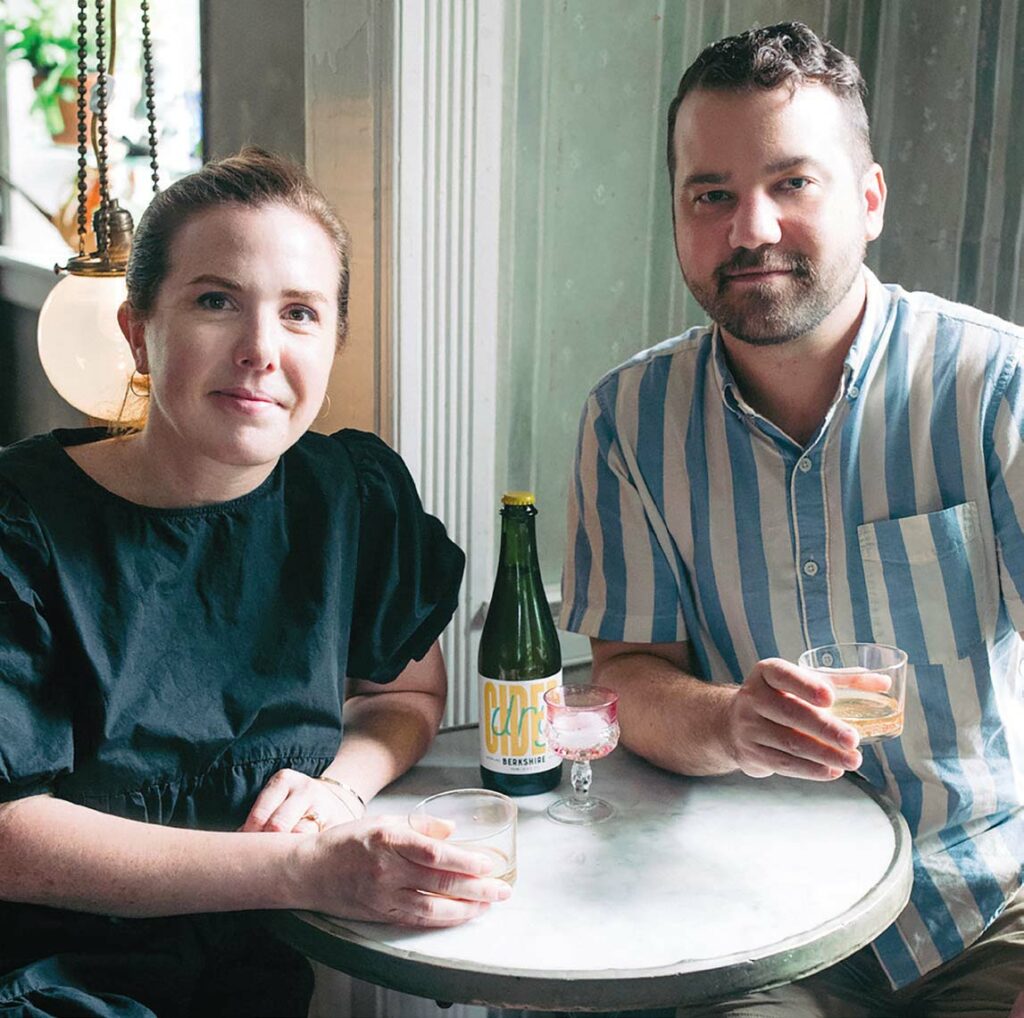
Cider Project
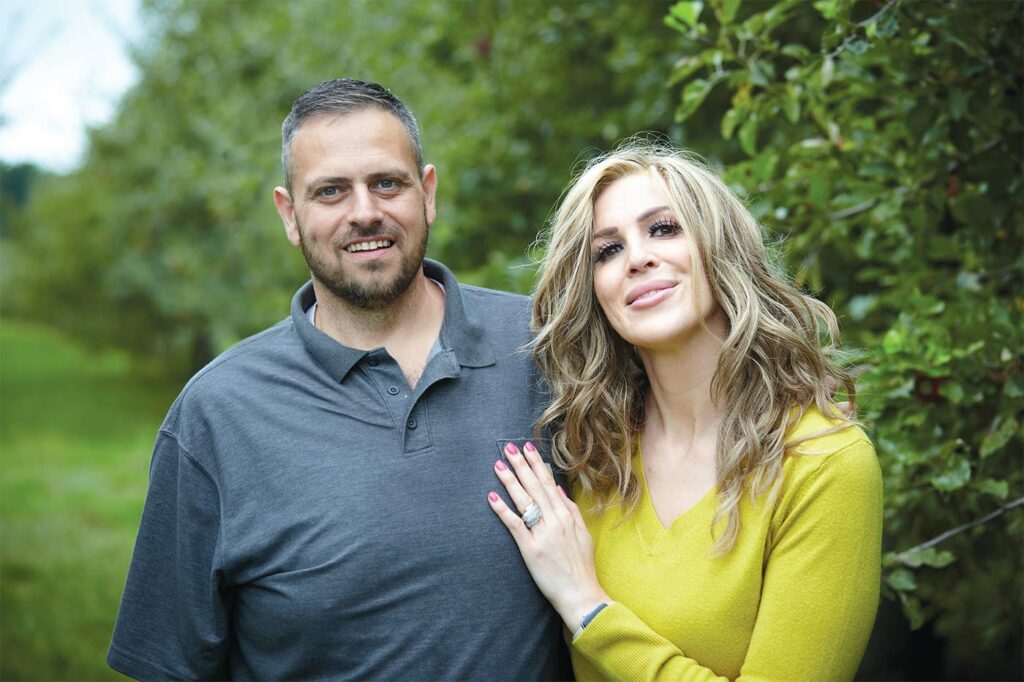
orchard.
On a balmy day at the end of June, Matt Brogan arrived at Hilltop Orchards in Richmond with his two assistant cider makers—Bri Rousseau and Caitlin Bunning—ready to roll up his sleeves. Matt and his wife, Kat Hand, the entrepreneurial team behind Berkshire Cider Project in North Adams, rely upon Hilltop for 50–60% of the apples they use to make their hard cider. David and Sara Martell, who manage 200-acre Hilltop, also make cider (hard and sweet), as well as wine, and some of the best cider donuts in the county.
To most of us who know both cideries, their collaboration is invisible and a little unexpected. They are the only two hard-cider makers in the Berkshires, so aren’t they competitors? Yes and no. The back story on how these two couples work together, and what it took for each of their businesses to thrive, provides a glimpse into the joy—and peril—of farming in the Berkshires. There is interdependence, cooperation, optimism, heartbreak, resiliency, and a shared devotion to the land and its bounty.
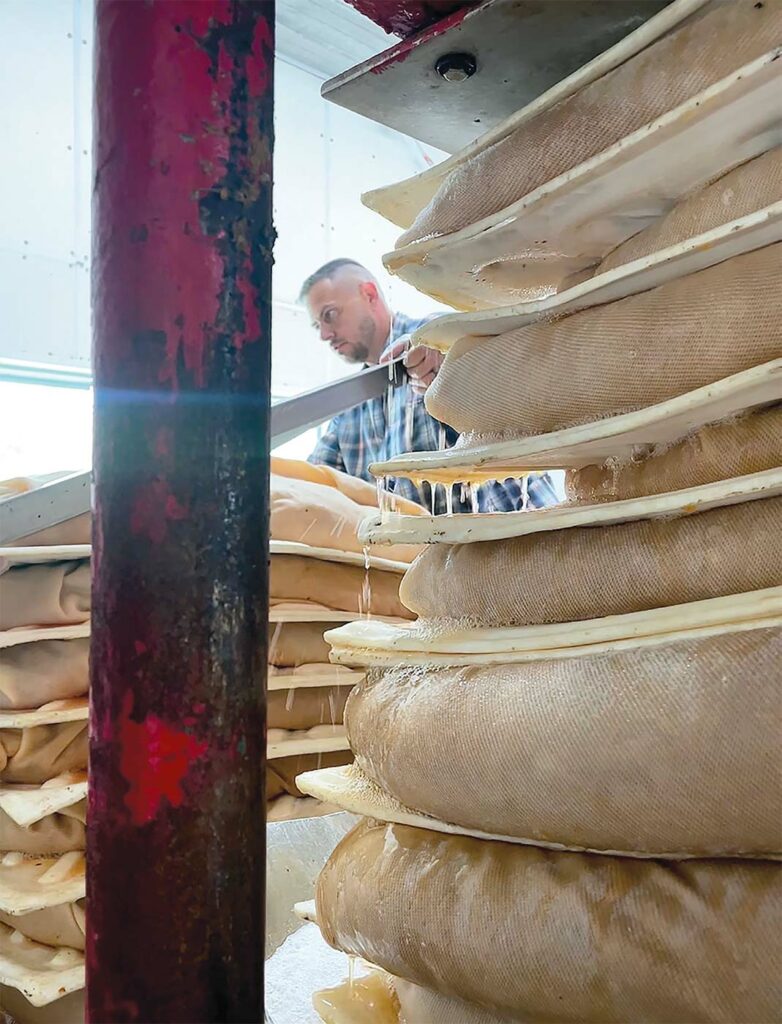
The back story on how these two couples work together, and what it took for each of their businesses to thrive, provides a glimpse into the joy—and peril—of farming in the Berkshires. There is interdependence, cooperation, optimism, heartbreak, resiliency, and a shared devotion to the land and its bounty.
David Martell operates the cider press. Photo by Matt Brogan
WHO’S THIS HOT SHOT?
David Martell remembers vividly the first time he heard from Matt. “I think he called me six years ago and he’s, like, ‘I’m gonna start making hard cider and I want to buy some cider from you. When can we meet?’ And I thought, ‘Who’s this little hot shot?’”
Hilltop started producing hard cider in 1997, 10 years after brother-sister team John and Wendy Vittori bought the orchard. John created the Johnny Mash hard cider brand, back when the little shack at the end of Hilltop’s driveway was the only “store” on site. “You could go to bars in New York City and Johnny Mash was on tap,” says David. “John was one of the founding members of the American Cider Association.”
David came into the picture in 2011, when John hired him “to help make cider and help clean the floors.” It took him just four months to fall in the love with the place. He and John settled into a mentor/student kinship that has deepened and endured. “David is a force to be reckoned with,” said John Vittori, who passed away last August. “We have a very trusting relationship and that is the bedrock of why it works so well.”
John stepped back from day-to-day operations in 2018 and David took over full-time management of the orchard and cidery. But, he says, “the best pressing I ever did was with John. He and I would start at 6 and by 11 we’d have 1,000 gallons and we’d be cleaned up by lunchtime, just the two of us.”
By the time Matt knocked on his door, David had established himself as an experienced cider maker with more than enough apples to meet his own production needs: Hilltop is now one of the oldest and largest commercial cideries in New England. With no orchard of their own, Matt and Kat needed apples and a good bit of help processing them into cider that they would then ferment in stainless steel tanks at their 1,200-square-foot space at Greylock Works in North Adams.
Sara Martell says there was “a mutual connection” between the couples right away. “I was so excited to have peers in the industry,” she says. “It was amazing that there was another couple who were cider enthusiasts.” The Martells agreed to supply Berkshire Cider Project with apples, to press the apples, and to deliver the cider to North Adams. But last June was the first time that Matt had participated in the process.
“Seeing how many apples it takes to fill a 600-gallon tank really puts each batch into perspective,” says Matt. “It helps us appreciate the work of everyone at the orchard. From pruning and growing to packing and pressing, a lot of labor goes into each glass of cider long before the juice even makes it to us.”
On that day in June, the last of Hilltop’s cold storage apples from last fall were washed and culled, put on a conveyor, ground up into applesauce, and loaded onto an old-fashioned rack and cloth press. Several hours and many aching muscles later, the work was complete. Hilltop delivered the cider to Berkshire Cider Project in 350-gallon totes loaded on a flatbed truck. Matt and his team pumped it into tanks, where it sits for up to a year and is then ready to be bottled and distributed.
“The best pressing I ever did was with John [Vittori]. He and I would start at 6 and by 11 we’d have 1,000 gallons and we’d be cleaned up by lunchtime, just the two of us.” —David Martell
Caitlin Bunning sorts washed apples before they go to the grinder. Photo by Matt Brogan
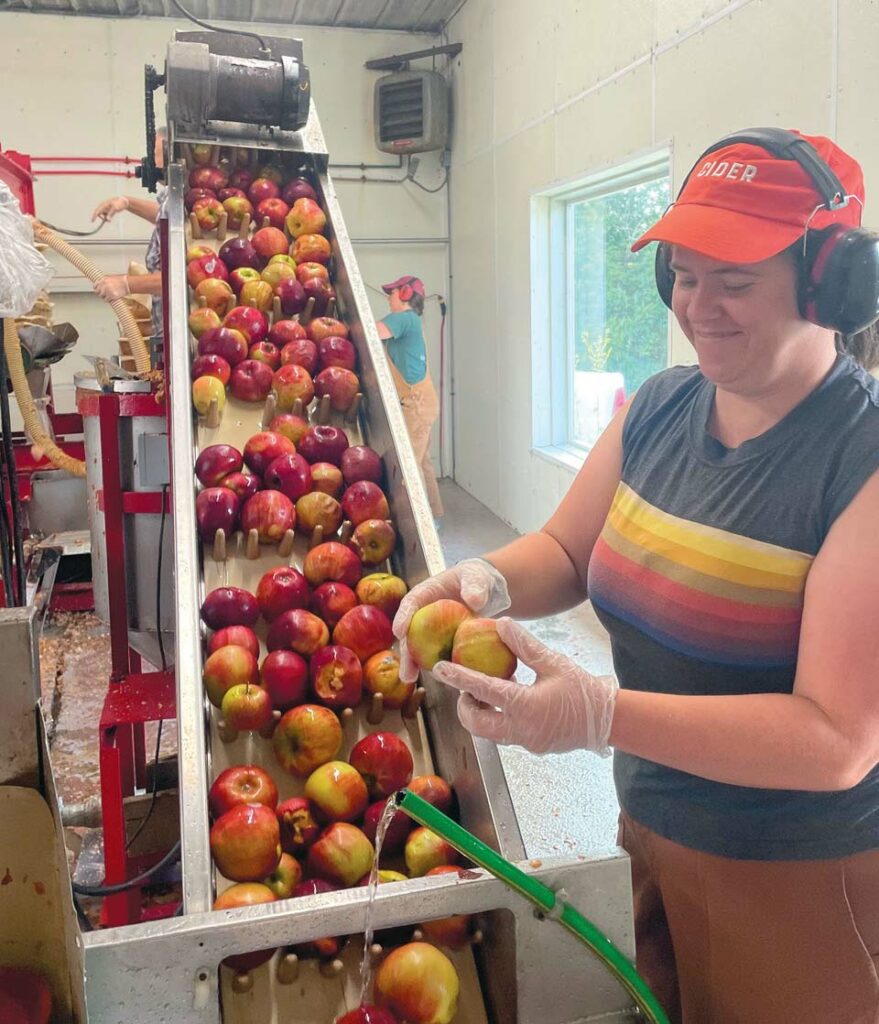
WE’RE NOT GOING TO START A BUSINESS …
Like so many entrepreneurs, Matt and Kat never imagined that their hobby would one day become a business. Eight years ago, Kat bought Matt a cider- making kit. He played around with it and expected the result to taste a lot like Angry Orchard: sweet apple juice with a kick. But that’s not what happened.
“It really caught our attention because it tasted like a young white wine,” says Matt. He became a bit obsessed with making hard cider that had a dryer, cleaner flavor palate. “But we never had the idea of starting a cidery,” he says. “I think we were very specifically against that. It wasn’t a business we knew anything about.”
But as it turned out, that didn’t stop them. Kat’s background is in corporate communications and sustainability; Matt had worked as a designer for several architecture firms. “I’m a designer and a tinkerer and it was like we couldn’t help ourselves,” recalls Matt. The more they experimented, the more intrigued they became. They were living in New York and visiting Lenox frequently to visit Kat’s parents who were second-home owners. They married at MASS MoCA in 2017 and made their own first big batch of cider for their rehearsal party at Cricket Creek Farm in Williamstown. Matt took a cider-making class at Cornell; Kat did the same at Oregon State. The writing was on the wall.
“The pieces fell into place in 2019,” says Kat. “We connected with the folks at Greylock Works and they were looking for startup businesses.” The 240,000-square-foot, 175-year-old former cotton mill was being renovated with an eye toward attracting restaurant, food production, co-working, and residential tenants. Space in the building, which has a trendy industrial vibe, seemed like just the ticket for a startup cidery. “It was a little bit of a match made in heaven,” says Matt.
By that time, the couple had moved to Washington, DC, for their jobs and they envisioned a seasonal side business: They would come up to North Adams in the fall, make their cider, spend time with Kat’s family, and work remotely for their respective companies. The tiny Greylock Works would house not only their production operation, but a tasting room. “We thought we’d sell bottles to restaurants every summer until we sold out and that would be it,” says Matt. “We had every intention of keeping our other jobs.”
COVID’S SILVER LINING
When Covid hit in March 2020, Kat and Matt had 1,000 gallons of cider aging in tanks. They had come to North Adams to paint a wall in their tasting room when the world shut down. Clearly, there would be no opening of their tasting room. So they hunkered down, bottled and labeled their cider, and started selling it to the public from their back window at Greylock Works in the summer of 2020. The public, eager for novelty and entertainment, responded enthusiastically.
In fact, one of Matt and Kat’s favorite projects started serendipitously during the Covid shutdown. “People were bored at home and probably had their kids around so they’d pick apples and bring them to us in buckets, and say ‘Can you do something with these?’” Matt recalls. “So we hung a huge sign outside that said, We Want Your Apples.”
Thus began Berkshire Cider Project’s community cider project: small batches of cider made entirely from donated apples. Those who donate receive special discounts and free bottles of cider. “I don’t think we ever would have done this on our own because it just wouldn’t have made sense,” says Matt. “But it’s so rewarding, and I think it also influenced our cider-making.”
“We thought we’d do three different ciders, 600 gallons each,” says Kat. But the community cider project so piqued their interest in small, specialty batches that they now produce 13–14 different ciders; sometimes there are only 10 cases to a batch. “It’s interesting to us and it’s interesting to customers,” says Kat. “They’re not just getting the same cider every time they come in.” Those small batches allow them to experiment with ingredients, such as pears and crabapples, and to take note of what works and what doesn’t. “We’re trying to build a library of knowledge, which is the dream of any kind of artisanal craft business,” says Matt.
And his “library” is now quite extensive. “There are a vast amount of apple varieties,” says David at Hilltop. “I could maybe give you 150. But if I call Matt and Kat, they’re going to tell me about another 150 and they’ll also tell me about the apples’ parentage.”
Hilltop experienced Covid challenges as well, but also had its own silver lining. On a personal note, David and Sara, who live on the Hilltop property, had planned to marry in the spring of 2020 at The Garden Gables Inn in Lenox. “Instead, we got married in a corner of the orchard, just the two of us,” recalls Sara. It was fitting, and the first of many Covid-time adjustments that would turn out to be for the best.
For years, Hilltop had been transporting its products almost five hours away to be filtered and bottled. “David was against the contract bottling from the start,” recalled John Vittori. “He preferred to have more control.” David got his wish during Covid. Wendy Vittori had tracked down a reasonably priced canning machine. So, the Vittoris invested in excess of $100,000 in a canning line, plus forced carbonation technology that instantly adds bubbles to the cider. The result: Hilltop became vertically integrated, meaning that the entire production process was on-site. The new process reduced their carbon footprint, gave the Martells total control over every aspect of their operation, and, most importantly during Covid, allowed them to remain safely on the farm.
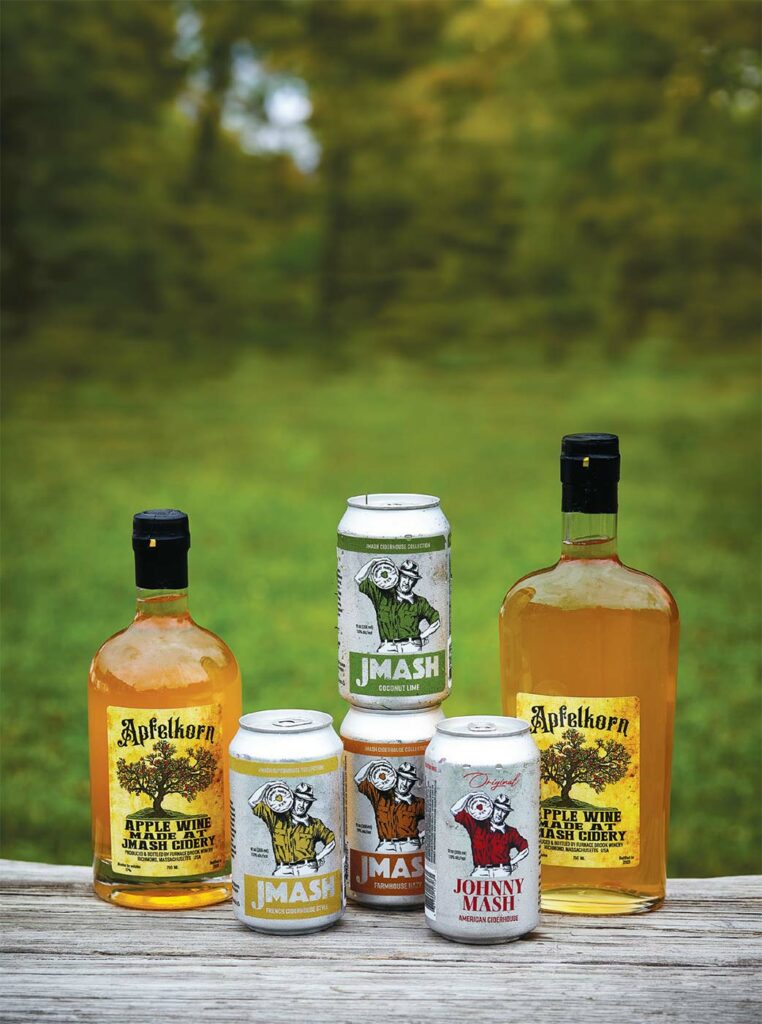
“We’re trying to build a library of knowledge, which is the dream of any kind of artisanal craft business.” —Matt Brogan
Photo by Mark Loader
FIRE AND FROST
But Covid was not the last hardship that Hilltop would endure. In the early morning of Christmas Day, 2021, Sara was awakened by the family dog, Benjamin, and a strong feeling that something was not right. Then she caught a faint whiff of smoke. A tractor, plugged in to keep its oil warm, had caught fire and wind had blown the fire into the building. By the time firefighters put out the blaze, a good portion of the building had been destroyed.
“The health board thought we’d be lucky if our retail opened up in four months,” says David. But thanks to his construction and mechanical skills, a dedicated staff working around the clock, and financial support from the Vittoris, they were back in business in a week.
Along with every other orchard in the Berkshires, Hilltop’s resilience was tested once again in May of this year, when blossoms that were coaxed open by an exceptionally warm spring were destroyed by a late frost. All over the county, orchards were declaring that 90% of their crop had been lost. Hilltop, because of its elevation, fared a bit better, with a 70% loss. “Frost settles in valleys,” David explains. “We lost all of our plants at the bottom of the hill, but at the top we lost none.”
Fortunately, frost-damaged apples can still be used for both hard and sweet cider. “We’re committed to taking care of ourselves and then we’ll take of Matt and Kat,” says David. “And there are handful of other cideries in Connecticut, Vermont, and Massachusetts that we’ll take care of, and then there’s cider up for grabs.” In addition to the hard cider that’s sold at the orchard, Hilltop also produces sweet cider that’s distributed throughout the county.
In our evolving food ecosystem, there’s room for everyone. “In the Berkshires, more is more.” —Kat Hand
Photo by Mark Loader
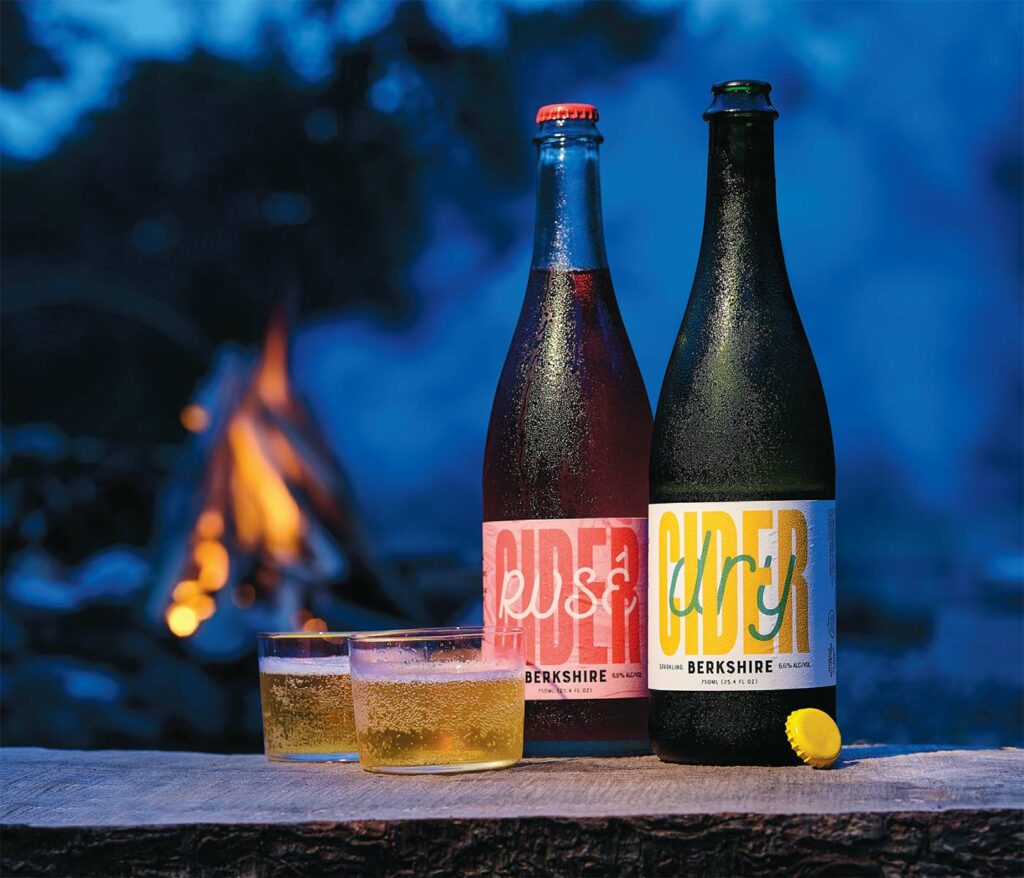
‘MORE IS MORE’
“Cider is like liquid art,” says David. Over the years, he’s perfected his art and expanded the Johnny Mash line (now rebranded as JMash) to include four varieties of canned hard ciders and a new bottled hopped cider that appeals to beer drinkers. Each contains a special blend of apples, aged and fermented for a minimum of 18 months in oak barrels. At harvest time, Hilltop can produce 10,000 gallons of cider a week. At the same time, the orchard is filled with visitors who pick their own apples, hike the property’s woodland trails, enjoy wine and cider tasting while taking in the spectacular view, and munch on warm cider donuts.
Forty-five minutes up the road, at Berkshire Cider Project, there’s a very different vibe. Matt and Kat’s operation is tiny by comparison, but the tasting room offers an “in the know” experience for serious hard-cider aficionados and the cider-curious alike.
“Matt and Kat attract a much more evolved cider drinker—people who really know apples,” says David. While Hilltop’s ciders are sweeter and more playful (there’s even a coconut- lime-flavored JMash), Berkshire Cider Project’s offerings taste more like dry sparkling wine or champagne. Matt and Kat also partner with Berkshire cultural institutions such as Hancock Shaker Village, and other orchards such as Windy Hill in Stockbridge, to harvest their apples and create co-branded ciders.
Both companies are expanding: The Martells planted 50 more trees in four new varieties this year; Matt and Kat are moving their production to a building down the road and hope to begin fermenting there this fall, freeing up space to expand their tasting room. “Right now we make 3,000–4,000 gallons a year and our goal by bringing on this new facility is to double that,” says Matt. But in the end, the apples rule the day. This year’s frost and a low yield last year means that hard cider will probably be scarcer and more expensive next year (cider ages for about a year). Nonetheless, Hilltop and Berkshire Cider Project will continue to support and complement one another. In our evolving food ecosystem, there’s room for everyone.
“In the Berkshires,” says Kat, “more is more.”



